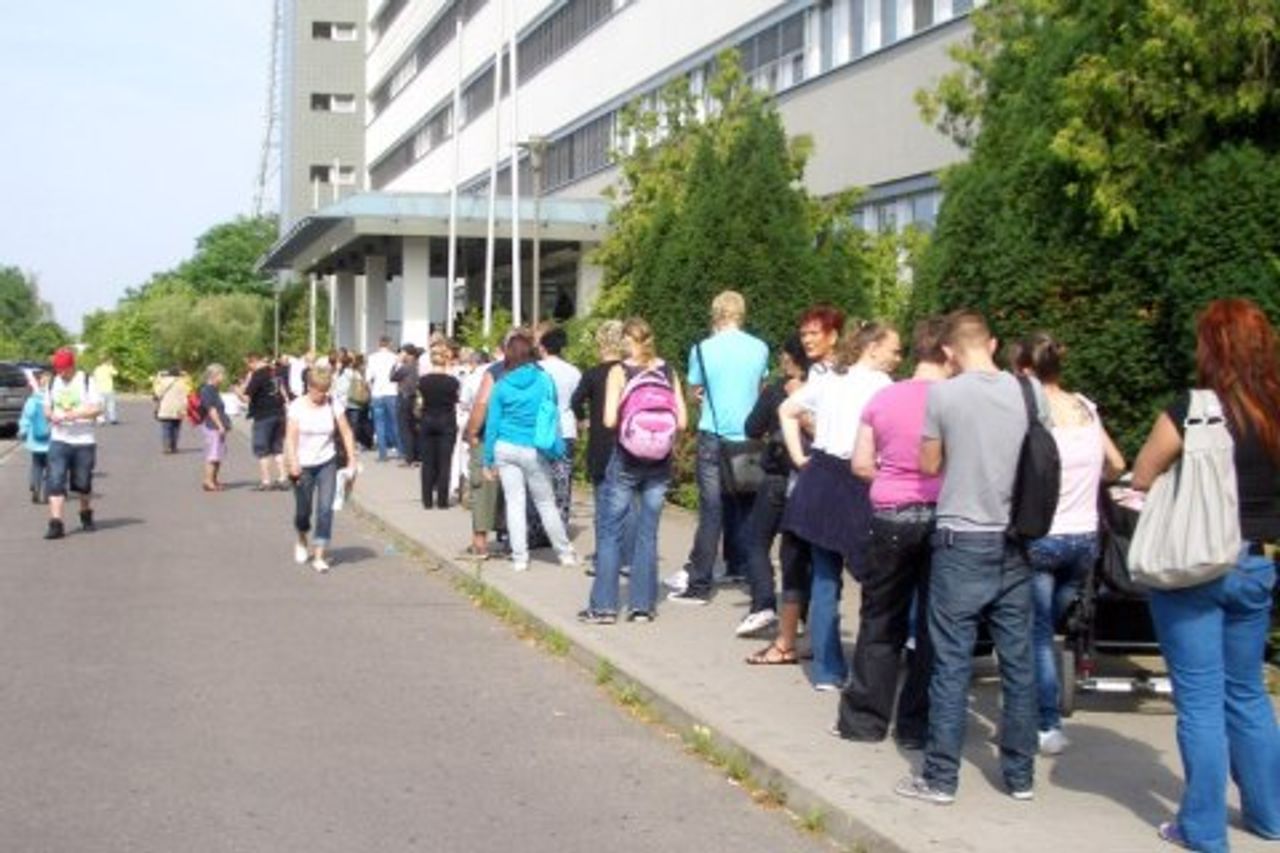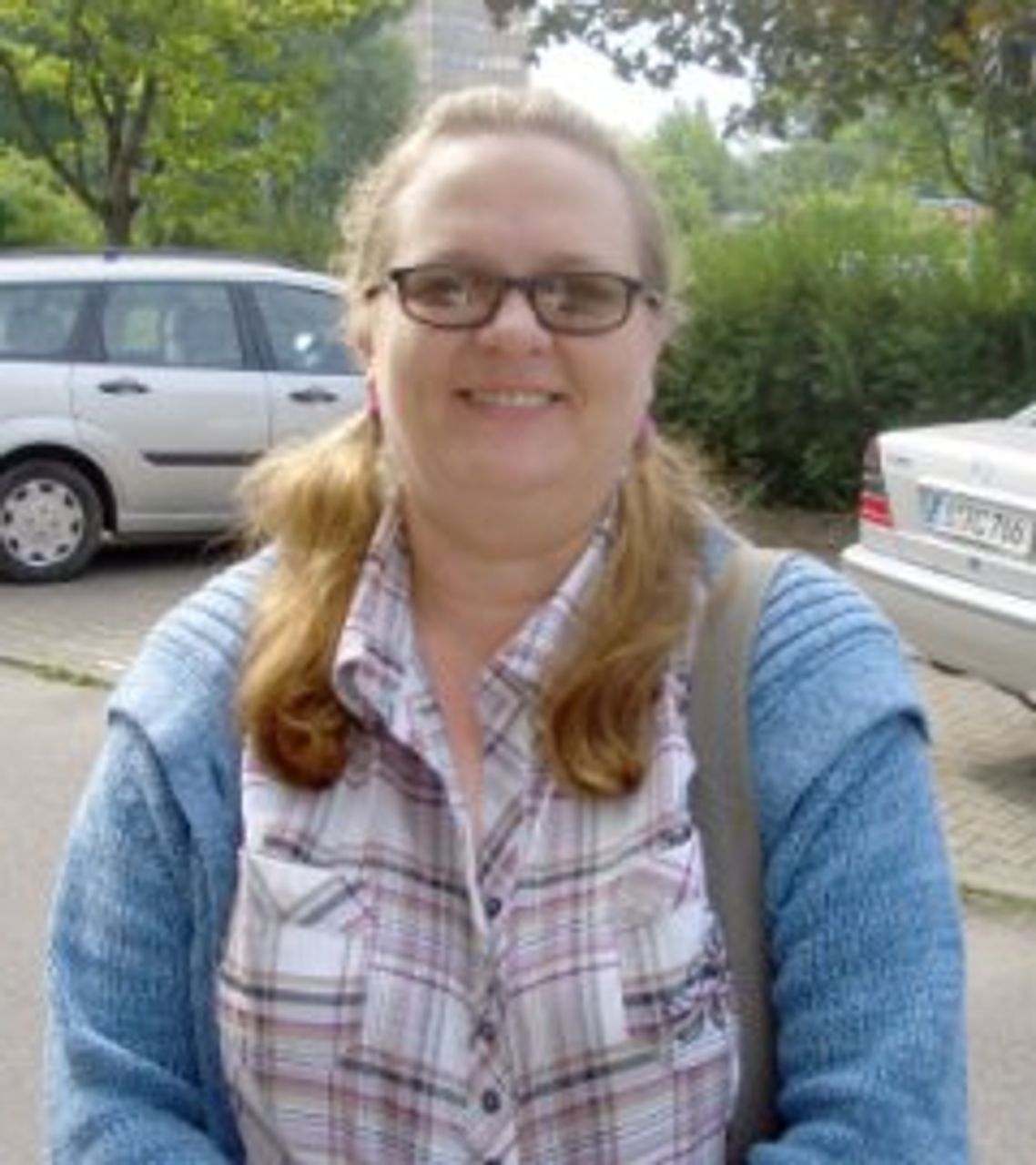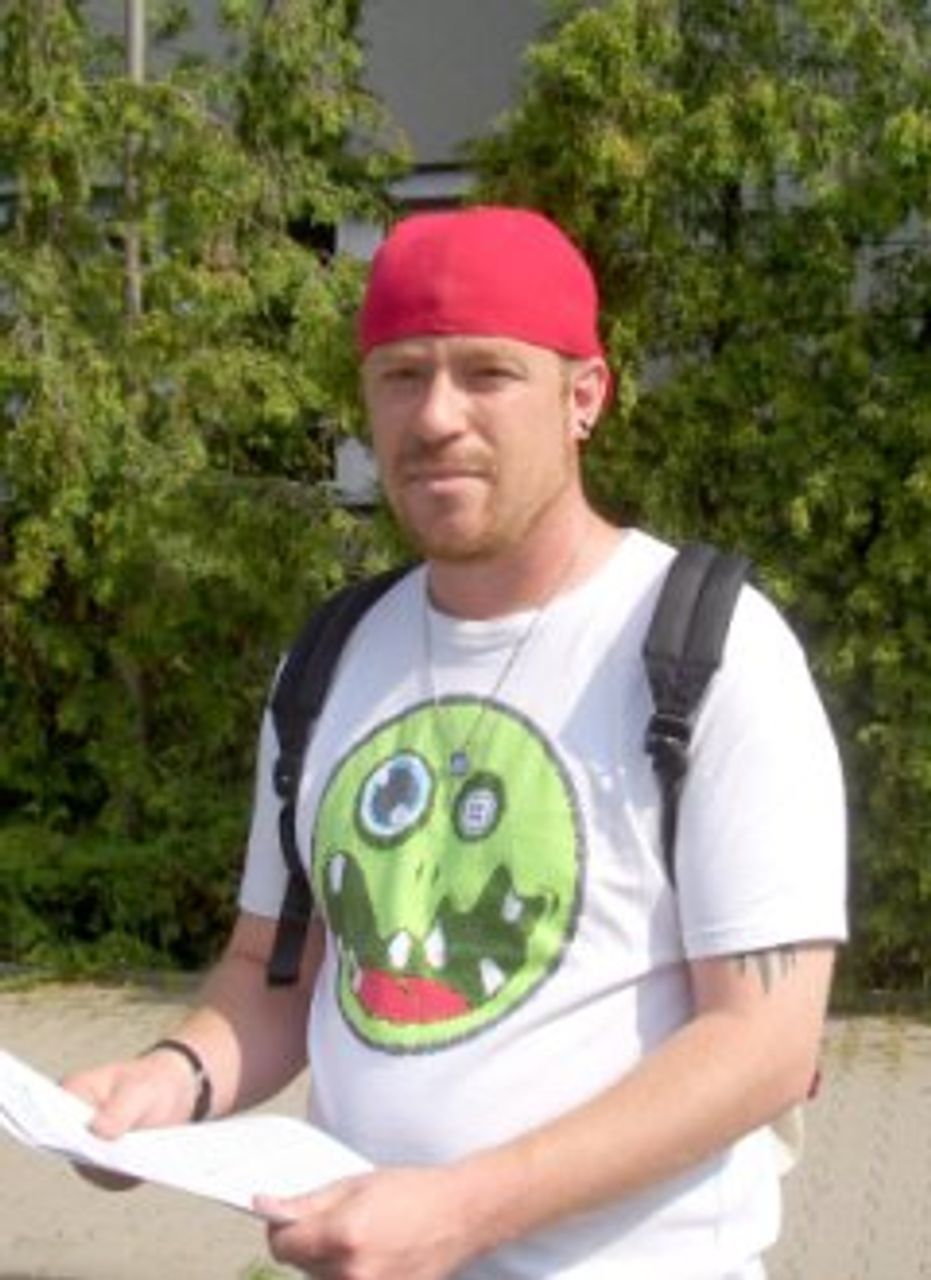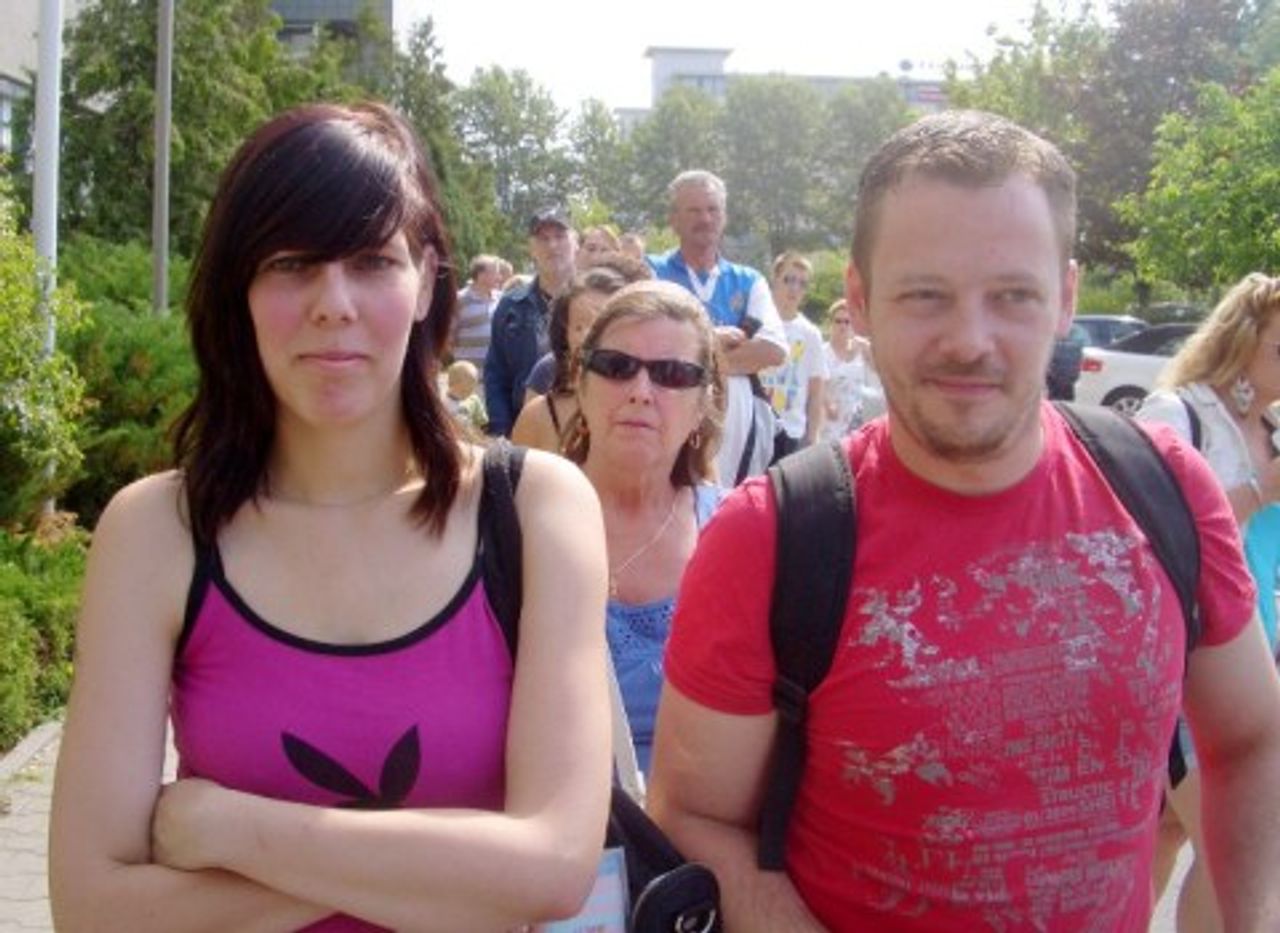In just four weeks, the Socialist Equality Party (Partei für Soziale Gleichheit, PSG) has collected more than 2,000 voter signatures to support its participation in the elections to the Berlin state legislature.
PSG members and supporters have organised an intensive campaign outside job centres, at supermarkets and in Berlin’s central squares, holding discussions with potential voters.
 Outside the job centre in Marzahn/Hellersdorf
Outside the job centre in Marzahn/HellersdorfIt became clear that many people reject all the official parties. The Social Democratic Party (SPD) and Left Party—which together have ruled the Berlin state legislature for the last 10 years, imposing devastating social cuts—are hated by many voters. But the memory of the Christian Democratic Party’s (CDU’s) cronyism in Berlin is still fresh, meaning this party is also widely rejected.
In many discussions, the PSG made clear that it rejects the entire spectrum of official politics. The PSG opposes the argument that working people should adapt their expectations to the current economic and political constraints, a position advocated by all the parties in Berlin. The PSG election manifesto states, “The claim that there is no alternative to the cuts in social spending provides the political framework for all the official parties and the trade unions. The PSG sees this as a declaration of bankruptcy on the part of capitalism. A social system that can only continue by destroying the lives of working people has lost its right to exist.”
Another key message of the PSG’s election campaign that has generated interest and agreement is the following: “It is not enough to strive for reforms and to beg for alms. It is necessary to prepare for a social transformation, which is centred on the expropriation of the large corporations and banks. Only this can create the conditions for the democratic control of all major economic decisions.”
Many regarded the fact that the PSG—which is not yet represented in the Bundestag or in the Berlin state legislature—had to collect 2,200 signatures in order to appear on the ballot as bureaucratic nonsense. Those supporting the PSG’s right to ballot status have to provide their full name (and where appropriate also their maiden name), date of birth and current address. The district election offices then check this information on each form and refuse to accept any of those without this information clearly written.
Many forms have been rejected since the person signing did not hold German citizenship, making clear the reactionary character of Germany’s citizenship laws. Many foreign workers, who often have lived for 30 or 40 years in Germany, pay taxes and have brought up their children here, are still not allowed to vote.
The PSG is also standing candidates in the district elections in Friedrichshain-Kreuzberg and Neukölln, meaning an additional 185 signatures are needed for each of these slates as well.
A focus of the campaign so far has been outside the job centres, where very long queues form. The unemployed often have to wait for long periods in order to obtain any support in finding a job or an apartment, or just basic information. Often, they are at the mercy of the officials who run the centres.
Some of the unemployed vented their anger when speaking to the WSWS.
 Marianne
Marianne Marianne had a child a year ago and now wants to re-enter her profession. She had previously worked as a carer for those with mental illness, and wants to find work in this area again, seeing this as her vocation.
She said that it is not easy to re-enter into the profession. Each time, various employment advisers tell her a different story. Another problem is that for the last six months she has had a torn cruciate ligament, but her medical insurance is not adequate, so she is sent from doctor to doctor and still has not received the necessary surgery.
Together with her partner, who works at an Edeka supermarket, they spoke about their previous experiences. Once, when they were both unemployed at the same time, they had more money than they have now. Marianne also had to work in a so-called €1.50 job (i.e., where you work for €1.50 more than the dole). She had been extremely diligent, to show that she really wanted to work, hoping to find a permanent job at the end. But that is very rare. In the end, you are treated like a slave in these jobs.
Daniel, 42, has had a heart attack and surgery on his knees and spine and also suffers from diabetes. He is virtually unable to work but still receives no pension. The job centre sent him on a one-year retraining programme for office work, which was a farce from the beginning because the qualification was worthless.
“The whole thing was unrealistic from the start”, he said, “Everything you learned—how to send faxes, photocopying, etc.—either the employer does themselves or they give these tasks to interns. But it means you are not counted in the unemployment statistics for a year”.
Asked what was responsible for such conditions, he replied, “social polarisation. There is no middle class any more, just rich and poor. Even if they work, many cannot live on their salaries. A friend of mine earns €600 net per month. If I were to work, I would at least like to have more money than if I were dependent on the government.”
 Tim
Tim Tim is 36 and has been working for two years as a relief worker. He says that the low-wage sector makes it increasingly difficult to find reasonably paid work, because employers prefer to pay €1.50 an hour rather than €6.50. At the same time, prices are constantly rising, while wages remain the same.
Prior to his current job, Tim had worked in leasing companies. He described this time as pure exploitation and slave labour. Most of the time he had to sit at home and wait to be called to a job. He had to be ready to go at a moment’s notice whenever a job came up. He agreed that a society that can no longer guarantee the livelihood of the vast majority of the population and provide essential basic rights, such as the right to work, adequate pay, housing and education, has lost its right to exist.
 Silvana and Ricky
Silvana and Ricky Silvana and Ricky have two children. Ricky lost his job as a store detective three months ago because he was sick for three days. Since Silvana is expecting their third child, they have had to relocate, but receive little help from the job centre in their search for a new apartment. One time, they had found a suitable flat, but the officials at the job centre waited so long to give them an answer about their claim for support that the apartment was already taken by then.
They also complain that after they had made an application for support for additional needs, a lady from the job centre now keeps coming to their home to check on whether their statements were correct. “She tells us how we should set up our own apartment, how we could live more frugally”, says Silvana. She said there should be a ban on such official harassment.
Joan, 22, is a law student in Frankfurt an der Oder. She lives with her mother, who has a so-called “mini-job” and earns a little over €300 a month, and is therefore still dependent on state support. They just manage to survive on her meagre wages, government subsidies and the student loan that Joan receives. The two have no more than €800 a month on which to live.
Joan should receive more money, as she is housed in a student dormitory when in Frankfurt. “But no one is interested in that”, she said. “The problem is that you cannot even complain about it. The courts are completely overwhelmed, because practically every second person is not receiving what he deserves.”
 Joan
Joan Joan willingly provided her signature when she was told about the policies of the PSG. She commented on the problems in Berlin and the massive welfare cuts of recent years: “If things continue as they are, the population will become increasingly impoverished.”
She pointed to the long queue outside the job centre and asked, “Do you think that these people are happy with their lives? For everyone, it’s just about making ends meet, whether there is enough money to take care of their child. Social protests are certain, and they are also necessary. People are angry. It shouldn’t all revolve around the question of whether you have enough money to live. A social revolution, I think it’s a good idea”.
A PSG member spoke about his experience collecting signatures: “We have found that most of those we ask to sign our ballot petition don’t trust any political party in the Berlin House of Representatives, from the CDU and Free Democratic Party (FDP) to the SPD and the Greens and the Left Party. A frequent comment is ‘They’re all the same’.
“For many, the bitterness with the politics of the SPD-Left Party Senate (state legislature) is so great that they don’t want to have anything more to do with any political party, and initially see the PSG in the same light.
“Only when we explain that we stand in complete contrast to all the other parties and don’t defend the profit system, like the Left Party does, but want to abolish it, does their attitude change and they agree to sign.
“Unlike previous election campaigns, it was striking that most people no longer see a socialist programme as a frightening spectre, as was still the case a few years ago. In particular, the expropriation of the banks and big corporations and their democratic control by the general population, as we call for in our election manifesto, found strong support among many workers and was the main reason given for providing their signature to support our standing on the ballot”.
